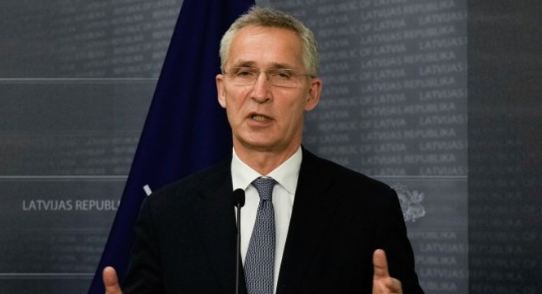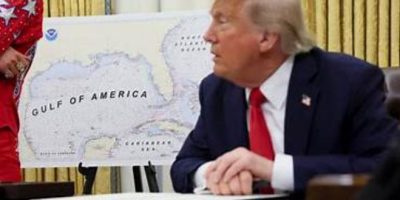‘Nothing will be same’: NATO chief warns of long haul in Ukraine

Russia‘s war against Ukraine has changed Europe like hardly any other event since the fall of the Berlin Wall. At the turn of the year, NATO’s secretary general calls on international partners to accept uncomfortable truths – including when it comes to arms deliveries.
For NATO, dealing with Russia’s war against Ukraine means walking a dangerous tightrope day after day.
On the one hand, the world’s most powerful military alliance wants to play an active role in ensuring that Kremlin leader Vladimir Putin‘s invasion fails.
On the other hand, it wants to prevent a direct military confrontation with Russia out of fear of a new world war.
CAN NATO SUCCEED IN BOTH OF THESE AIMS?
NATO Secretary General Jens Stoltenberg explains why military support for Ukraine is, in his view, the fastest way to peace. And he recalls the day that changed so much in Europe.
Question: On the early morning of February 24, Russia started a war against Ukraine. Tell me how you experienced this morning. Were you woken up or were you awake when it started?
Answer: It was a very short night. When I went to bed, I knew they were going to invade, so I thought it would be a good thing to have some hours of sleep. But not many hours passed before I received the call from my chief of staff confirming that the invasion had begun.
Q: What happened next that morning?
A: I immediately condemned this reckless war of aggression, but more importantly, I convened the North Atlantic Council here at NATO early in the morning. There we activated NATO’s defence plans and started to deploy additional forces to the eastern part of the alliance – to prevent an escalation of the war. Everyone here at the headquarters knew exactly what to do. We were well prepared because this was a long-predicted invasion. US President Joe Biden, I and many others have been warning about the invasion for months.
Q: You knew what was going to happen. Why couldn’t Russia be stopped from invading?
A: We made serious attempts to dissuade Russia from implementing the plans. As recently as January, we made a last diplomatic attempt at the NATO-Russia Council to convince Russia to change plans. The meeting was a follow-up to a letter sent by Russian President Vladimir Putin to NATO with specific demands. We have responded with our proposals and tried to keep the political process going.
I remember that the Russians told us that they had no plans to invade Ukraine. We knew that the contrary was the case. But plans can be changed until they are implemented, until the tanks roll, the troops march and the bombs are dropped. We believed in diplomacy until the end, but President Putin had no interest in a peaceful solution.
Q: Did you expect on February 24 that the Ukrainians would be able to defend themselves for such a long time?
A: We were, of course, uncertain. But we knew that the Ukrainians are much more capable now than in 2014, when the war started. Since then, NATO and NATO allies, in particular the United States, Canada, and the United Kingdom, have provided significant military support to Ukraine with training and equipment. This has contributed to the Ukrainian armed forces being much larger, much better equipped, much better trained and much better led in February 2022 than they were in 2014. This also explains why they were able to defend themselves much better than eight years earlier.
Q: In recent months Ukraine has increasingly attacked military targets in Russia. Do you support this strategy as NATO secretary general? Or would you advise Ukraine against further attacks of this kind because nobody knows what the reaction would be?
A: We support Ukraine in the right to self-defence. That is a right which is enshrined in the charter of the United Nations. Every country has the right to defend itself – also Ukraine. We also need to understand the context: massive Russian attacks on civilian infrastructure aiming at depriving Ukrainian civilians of water, heating, and electricity during the winter. President Putin tries to turn winter into a weapon against civilians. This is not an attack on military targets with civilian collateral damage. This is a massive attack on civilians because millions of Ukrainians are deprived from these basic services.
Q: If it turns out that attacks on military targets in Russia are the only way to force Russia to surrender – would you advocate that NATO countries provide Ukraine with capabilities to effectively combat military targets in Russia?
A: It may sound like a paradox, but military support for Ukraine is the fastest way to peace. We know that most wars end at the negotiating table – probably this war too – but we know that what Ukraine can achieve in these negotiations depends inextricably on the military situation. So if you want a negotiated peaceful solution ensuring that Ukraine prevails as an independent democratic state, the best way of achieving that is to provide Ukraine with military support. That’s the way to convince President Putin that he will not achieve his goal of taking control over Ukraine.
NATO allies have already supplied Ukraine with long-range weapon systems, for example, HIMARS rocket launchers and long-range artillery. Drones and armoured vehicles are also being provided.
Q: Would it be okay to provide Ukraine with medium-range missiles?
A: There is an ongoing dialogue between allies and with Ukraine on the specific systems.
Q: Is it a purely national German decision to send combat tanks or its Patriot systems to Ukraine?
A: We have good consultations at NATO on these issues and in the US-led Ramstein format. Of course, I call on allies to do more. It is in all our security interests to make sure Ukraine prevails and Putin does not win. But it is not just about providing more weapons systems. Perhaps even more important is that there is enough ammunition for the systems already in place. The need for ammunition and spare parts is enormous.
Q: You said a few weeks ago that Russia is trying to freeze the war to prepare another offensive in spring. What are the indications?
A: There is no indication that President Putin has changed his overall objective of this war. This is to control Ukraine. They have mobilized many new troops. Many of them are trained by now. They have demonstrated a willingness to endure painful losses and they are turning to other authoritarian regimes, including Iran, to get more ammunition and more weapons. This is not over. Wars are unpredictable, but we have to prepare for the long haul and also for new Russian offensives. We should not underestimate Russia.
Q: German Chancellor Olaf Scholz recently said that economic cooperation between Germany and Russia could be possible again if the Kremlin ended the war in Ukraine. Do you agree?
A: Nothing will be the same as before. An end to the war cannot mean a complete return to normality. What kind of relations there will be with Russia in the future will depend on Russia’s behaviour. I think it’s hard to imagine that we will end up again being so dependent on critical strategic commodities like energy. Because dependence on Russia has created points of attack that Russia is now trying to use to stop us from supporting Ukraine. Dependence on gas has made us vulnerable.
Related News

Man trying to access Trump Florida estate killed
News Desk WASHINGTON: The US Secret Service said Sunday its agents had shot and killedRead More

World Scout Day: Pakistan youth urged to embrace community service
ISLAMABAD, Feb 22: International Commissioner, Pakistan Boy Scouts Association (PBSA), Amanullah Kanrani, on the occasionRead More


Comments are Closed